No sense of reality about political settlement in Syria
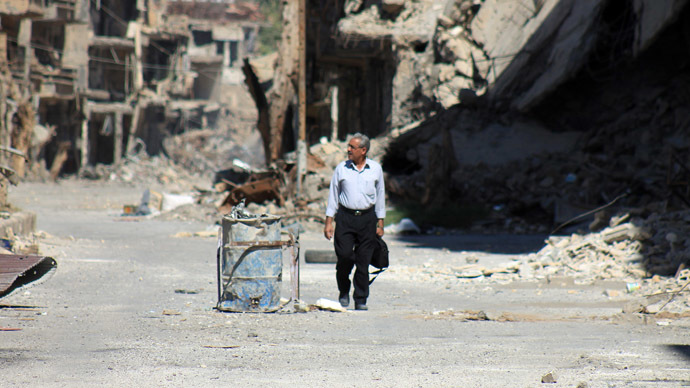
The new proposal to sequester the Syrian chemical weapons is a useful way to prevent a repetition of their use, but it should be combined with an effort to move back to Geneva, former US diplomat Thomas Pickering told RT.
Pickering has served as an ambassador to the United Nations, Russia and Israel, among other countries. He believes that the proposal to rid Syria of chemical arms provides a great opportunity for Barack Obama.
Time for humanitarian ceasefire in Syria
RT:What do you think of John Kerry’s proposal, which was picked up by Russia – the idea of transferring Syria’s chemical weapons arsenal under international control? Is that reason enough not to strike Syria?
Thomas Pickering: My view is that it’s a forward step and it makes some sense. Whether it can avoid a US attack or not remains to be seen, and what the US reaction will be we’re still waiting to see at this stage. What I’ve always believed is it’s very important to see how quickly we can move back to Geneva, as difficult as it is.
But I think a political settlement is the only possible outcome here that makes any sense. Otherwise we have a contingent civil war, we have gigantic killings, we have serious destabilization of the region, we have uncertainty for the long term about where this process is going and we have radicalization from both sides. There’s no question at all that Iran Revolutionary Guard training of President Assad’s forces in an Alawite militia is leading to a more Shia-oriented radicalization of that group.
But certainly on the opposition side, the growing strength of [Al-Nusra Front] with its Al-Qaeda influence is something I think neither of us should be comfortable with on either side. So in fact we have a secular fight between Shia and Sunni, which looks like it’s going to get worse. I don’t see how it’s in anybody’s interest to continue pushing on.
And I don’t believe that the early myth that one side or the other would win a quick victory has any relationship to the current situation. I also think it’s time to perhaps stop supplying the sides with more weapons – which seems to go on – and it’s time to look for a humanitarian ceasefire.
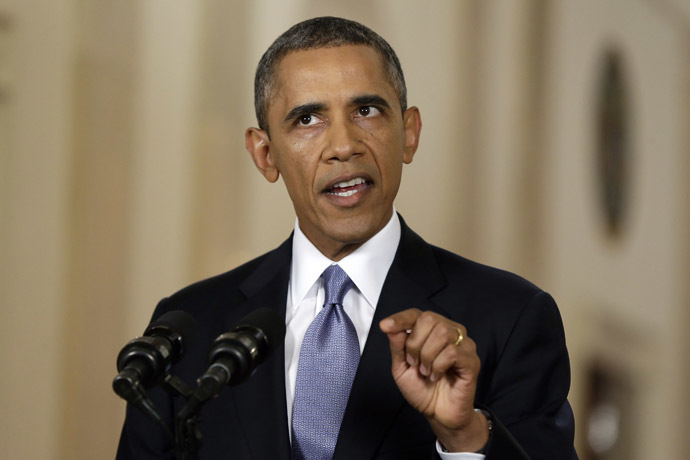
RT:What about the possible strikes, do you think they will get us any closer to a political transition, or further away from it?
TP: I think it depends on how the strikes are conducted and with what objective. The administration has been saying for weeks that it would conduct the strikes in a way that would promote a political settlement. Let’s hope they are, if they intend to do it.
Any military action will have an impact. The really interesting question is ‘how can that impact become useful? I won’t say ‘helpful’, I won’t say ‘positive’, but useful in moving the parties toward a political workout. Or is it merely going to be a continuation of military fighting. What in my view would be useful would be something that would once again convince President Assad that there was no military victory despite the reported gains he’s been making.
Obama in real quandary
RT:What do you think the US should do instead of bombing Syria?
TP: I think it’s up to the president to decide, and in my view he faces a real quandary now. That quandary has been that he’s convinced – and I believe that he’s right – that any violation of the prohibition against the use of highly lethal chemical weapons is a real violation of international law. I add that every step should be taken to make sure that that never happens again, including the use of military force to make sure that the side that uses them is never going to have the confidence it is going to get a military gain out of that kind of use.
On the other side, the president faces the quandary that contributing to ongoing fighting is in itself not an answer to the long-term problem of Syria. That’s why I believe it’s very important to look at the present situation – as challenging and difficult as it is – as perhaps another opportunity to see whether you can push toward the political settlement that I think both Russia and the United States have given lip service to, that they said they support, but they don’t seem at this stage to have any sense of reality about ever making that happen.
Now, this new proposal to sequester the weapons is perhaps a
useful way to prevent any repetition of their use. But I’d like
to see it combined with an effort to move back to Geneva. And
that will require some things on the part of both sides. It’ll
require getting rid of the idea that there are preconditions for
negotiation. And it will require getting rid of the idea that
there’s a linkage in negotiations – that nothing can be achieved
until everything is achieved. Both of [these] are diplomatic
roadblocks to negotiation.
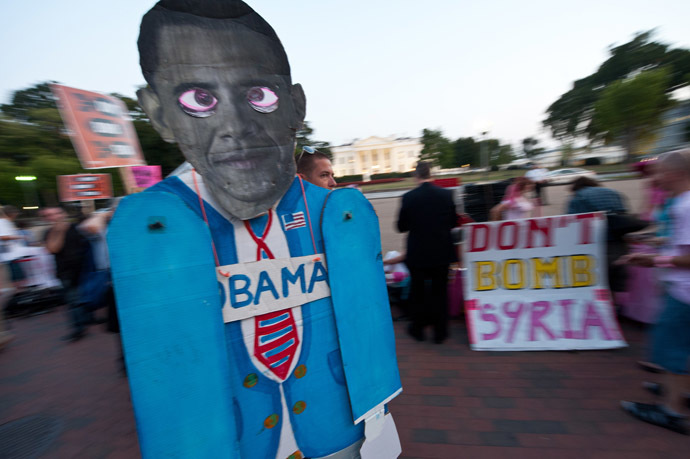
RT:What kind of effort do you think it would take on the part of the Obama administration to convince Syrian opposition leaders to come to the negotiating table? Because talks are off the table at this point.
TP: I think it would take a serious effort, but the Obama
administration is about to make a serious effort in the interests
of the opposition, if it in fact attacks Mr. Assad’s forces. So
why not use the leverage that would come from that kind of an
attack? Plus, in fact, what I would say is a consensus in the
international community on both sides to reopen the political
dialogue.
'Usually you don’t take classified information to UNSC’
RT:Why doesn’t the US take the classified evidence they have to the UN Security Council?
TP: Well I would hope they would, or enough of it to the UN Security Council to convince them it’s correct. You said the information was classified and usually you don’t take classified information to the Security Council. Now maybe they can declassify some and I’m not arguing on that I think that may well be an important step to take. It’s necessary I think for the party that wishes to strike to provide as clear an indication that President Assad was involved in this and that he did the attack as they can prior to making the strike. I think that’s what President Obama has certainly been trying to do but he has perhaps another step yet to take.
RT:Do you think on a matter so serious the administration can really hide behind the word classified? Ten years ago the Bush administration falsified some evidence, showed some slides, as this administration just says: classified.
TP: I think the Bush administration, at best, seriously misinterpreted what they provided. I don’t think they falsified, I have to give them at least that position. So far President Obama has talked about the sources of his information, the kind of information, and now the world is asking ‘Okay what is that? What can you show us? What can you provide?’…The horrible videos are horrible videos but we don’t know when did they come and what were the antecedents to creating the situation which the videos took pictures of. They were the results of an attack.

TP: I think it’s a question we must seriously consider and I think that to one extent the notion that half the leaks say the strikes are really going to be bigger than people indicate and the other half, the statements, are that the strikes are going to be just a kind of tap on the wrist is an indication of concern about what I would call the ramified reactions to the use of military force in Syria.
I think the Syrians, and I believe they did this, have done terrible things and I believe, in fact, that it’s appropriate to hit them. But that doesn’t mean necessarily that the rest of the world is going to sit back and say ‘We agree with you 100 percent, you’re doing the right thing, and it’s not going to create some difficulties.’ There are all kinds of difficulties that can be created here, certainly the potential for negotiations with Iran that are in the offing at the present time, may or may not be a problem. The reaction to Hezbollah against Israel may or may not be a problem. Further radicalization of actions in the Middle East could be a problem. Difficulties in the countries that are now enjoying a certain amount of instability, like Egypt, could be a problem.
So your imagination is not very limited here in trying to discern
certain problem areas that might result from American military
strikes. On the other side of the equation, however, I have to
say to you that there are other problem areas. It’s clear to me
that Assad has been creeping up the use of chemical weapons and
he went past a threshold. If he gets by with that threshold will
he stop? Of course not. If we just sit back and say ‘Well you
were terrible people but we were deterred from using military
force to stop you from escalating.’ His immediate inclination
will be to say these are great things, they’re supporting our
side, we’re about to go under if we don’t use every weapon we
have, we now have a clear green light, our Russian friends are
supporting us, our Iranian friends are supporting us, the rest of
the Muslim world would be destabilized if people used force
against us. So why not? So the next attack will be worse and the
one after that will be worse.
Syrian govt acted defensively over chemical attack
RT:Have you asked questions about the timing of the attack? At the time the UN inspectors were on the ground the government was making gas. They killed lots of people with conventional weapons, why would they use chemical weapons?
TP: That’s a very good question. One can only take the kind of evidence that has been alluded to that in fact they carefully prepared this, they took their time, they carried out an attack, and they stopped it perhaps too quickly because it may have gotten out of control, that they seemed as well to have used artillery fire to try to cover the evidence, the UN inspectors were shot at when they went in to keep them away.
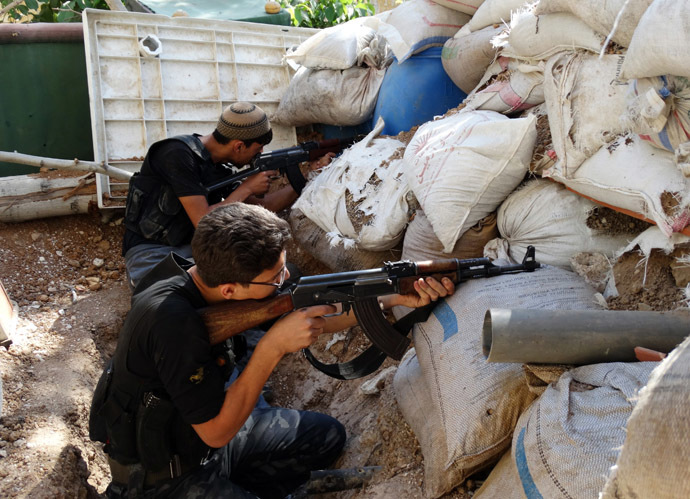
TP: If all of what you say were true about the attack why didn’t they take the UN inspectors there and show them, in fact, that it was the rebels who shot this at them, showed them the pictures of the rockets, or showed them the rockets themselves? That in itself is open to question. They acted in a very defensive way. If in fact they had nothing to be defensive about they should have been the first on line in the presence of UN inspectors with something that was very fortuitous for them. Of course, I think it worked the other way and I think we are seeing the results of it working the other way.
RT:And also the fact that it was the UN inspectors who were shot at. It has not been ascertained that it was the Syrian Army that was shooting at them.
TP: Well they were in Syrian government controlled areas (laughs).
Conflict in region not in Israel’s interests
RT:The US cites Israel as an argument for strikes in Syria. What do you think is in the best interest of Israel?
TP: Israel, interestingly enough, has wanted to stay out. It doesn’t have a favorite side in the fight. It had seemed very early on to want stability in the Golan Heights. It used military forced at least two or three occasions when the Golan Heights began to get out of control, to seek a calm [sic] in the situation, and to shoot at people across the border for one reason or another. And it used strikes for what were apparently new high-tech weapons from Russia or from Iran to try to calm the situation or to protect from attacks against itself.
My own view is that the Israelis have not sought to inflame the
situation, have not sought to choose sides, and have sought to
make it clear that they will defend themselves and have made it
quite clear they have been careful in their actions and their way
of proceeding.
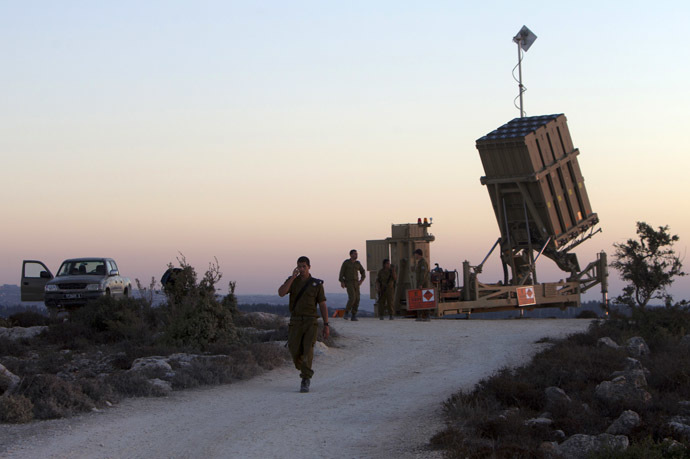
RT:The rebels are kind of unpredictable for Israel. The government is hostile at this point with the statements and everything. Isn’t it better for Israel that the two sides are kind of at each other’s throats and the conflict keeps simmering?
TP: Well I think that it would be perhaps superficially correct to believe that the Israelis would in fact not mind if Syrians continued to kill Syrians. The truth is that this isn’t something confined to Syria. We see Jordan destabilized. We see Lebanon destabilized. We see indeed part of the impact on Iraq. We see certainly Turkey on uncertain terms and Israel itself, at least on one or two occasions, has been engaged in this particular question because they have a common frontier or a common border area with Syria.
I don’t believe in fact that the Israelis believe necessarily that it’s in the best interests of Israel to have this kind of uncertain, unpredictable conflict in a region in which it has to live continue. On the other hand they have been very careful, as I said a moment ago, about taking sides.
RT:As I understand now Israel is lobbying for the strikes, right?
TP: I have no idea. It’s not impossible that they are (laughs). I haven’t talked to AIPAC so I don’t know what they’re saying.
‘I hope US will use strikes to bring positive direction toward political settlement’
RT:In these discussions on Capitol Hill with US officials testifying, we haven’t heard much about the interests of the Syrian people. We hear about the US sending this message and that message about the US worded very vaguely. Why do you think that’s the case?
TP: I think that’s wrong and in fact too bad. In my own view the major reason to move as soon as possible is it doesn’t look like this war is going to work itself out in any direction any time soon and that between 6,000 and 7,500 Syrians are dying each month and that should be the primary requisite for the US and Russia to get together and stop the fighting. Then see whether through a political process, difficult as it may be, one can begin to work on the question of future governance in Syria.
RT:Do you really believe that the strikes are going to make this political process easier?
TP: I’m only telling you in response to your question my opinion that one ought to conduct the strikes in a way that is oriented to achieve that objective. I’m not telling you I’ve decided, because I can’t, that that’s the way to conduct the strikes, but I’m expressing, put it this way, the hope that the US will take seriously what it says in its points that it is making that it favors a political settlement and will use the strikes in a way to try to affect positive direction toward a political settlement.
The statements, views and opinions expressed in this column are solely those of the author and do not necessarily represent those of RT.












